No #NAFTA2, Yes to Trade for People and Planet
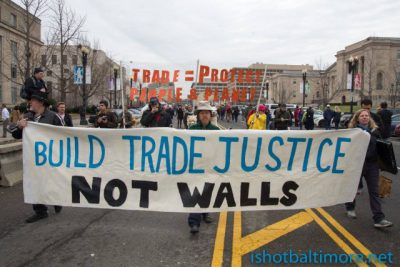
The Trump administration is renegotiating the North American Free Trade Agreement (NAFTA) with Canada and Mexico in secret, just as President Obama did with the TPP. Over the past two decades, NAFTA has resulted in workers losing their jobs and being replaced by machinery, ruined family farms throughout the continent, displaced communities and privatized social services, environmental disasters like the BP oil spill in the Gulf of Mexico and a widespread attack on labor rights and unions.
Everything the new administration has done indicates that NAFTA2 is a deal that, once again, prioritizes the interests of corporations over people and the planet. Workers in each country will be worse off, the planet will be threatened by further contamination of the environment, and big corporate interests will take precedence over the sovereignty and democracy of each country.
This week, we explain our opposition to NAFTA2 and put forward a strategy to remake trade so it is no longer corporate-driven trade for the profits of a few, but people-driven trade to benefit all and protect the planet. See the list of actions below.
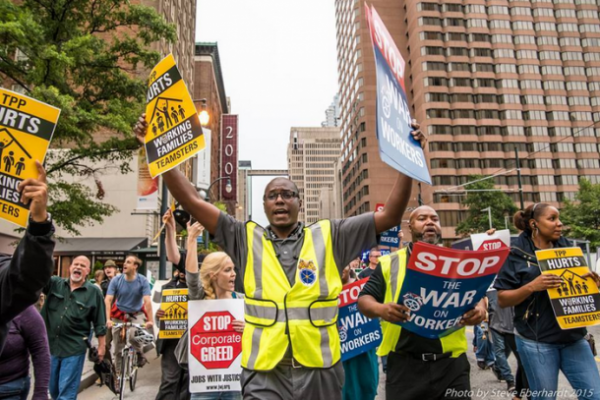
Pitting Community Against Community
In the United States, while both Democrats and Republicans continued to pursue larger-scale free trade agreements with the Trans Pacific Partnership (TPP) and others, Republicans also fought against a national agenda of greater racial equality. Trump’s rejection of free trade deals that hollowed out the industrial Midwest along with his unapologetic contempt for people of color were fundamental factors for his popularity among the white working class. As a voting bloc, they decided they would benefit more from making their political allegiances based on racial supremacy rather than class unity through a labor movement that had been failed by the Democrats. Ta-Nahesi Coates’s brilliant article, “The First White President,” details how the re-formulation of this cross-class white coalition is deepening a long legacy of race playing a central role in US politics.
NAFTA is a deal that lets corporations pit North American communities against one another to attain the lowest price and the highest profit and that will not change under the Trump administration. There is no tweak or modernization that can change this fact. No deal that seeks to employ and benefit the white working class while jeopardizing the very livelihood of black and brown folks in the United States, Mexico, and Canada should be deemed acceptable to anyone and must be made politically toxic to pass. The trade justice movement must be committed to changing the corporate trade model that NAFTA represents with trade that benefits working people and the planet.
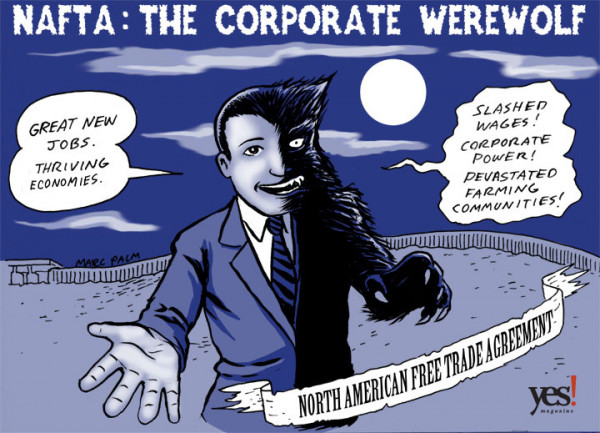
NAFTA 2 is a Trade Deal that Serves Powerful Corporations
The central struggle in NAFTA is between transnational corporations and the people and communities of North America. The Trump administration’s economic team is made up by two corporate factions that are learning to work together: advocates of free trade agreements like the TPP and economic nationalists who more explicitly seek US (white) supremacy over the international economy. Both models uphold a system in which powerful corporations and their governing allies benefit most when the people are dis-empowered. They benefit when we are displaced and divided.
The ‘Modernize’ NAFTA Camp
Free trade advocates that want NAFTA to be ‘modernized’ remain amongst the more powerful stakeholders in the negotiations, especially with the removal of Steve Bannon. Consistent with neo-liberal trade policy, under their Wall Street model of trade, they view the renegotiation of NAFTA as an opportunity to reshuffle trade by using the TPP as its foundation so the rules of the game benefit transnational corporations.
Trump’s NAFTA would likely include an expansion of the Investor State Dispute Settlement (ISDS) mechanism to be similar to the TPP, which allowed corporations to sue governments if they take any action that threatens potential profits. For example, the government may be sued if it violates strict intellectual property provisions like those that benefit the pharmaceutical industry in the interest of public health or if it challenges new digital trade provisions that undermine Internet freedom.
Through ISDS, transnational corporations could also sue the government if it tries to implement stronger environmental and labor regulations. The judges of these tribunals are mostly corporate lawyers who in the past have consistently ruled against any progressive legislation, resulting in millions of taxpayer dollars being handed over to corporations, as is well documented in this “Global Super Court” BuzzFeed series by Chris Hamby. The powerful players in agribusiness will keep fighting for domination over family farms, and corporations like Monsanto will keep urging legal protection of their monopoly over seeds. Unions will continue to be trampled on by corporations’ ability to pit communities, cities, and governments against each other for their own benefit. Communities of color will remain the principal victims of mass incarceration, poverty wages, workplace discrimination, and environmental racism.
The Economic Nationalism Camp
The economic nationalism camp is the Make America Great Again faction of Trump’s trade team, advocating for the government to use the country’s position as the world’s largest consumer and third largest exporter as an extortion mechanism to get unfair advantages for US corporations.
They put forward the myth that if US corporations are succeeding, then the American worker is succeeding. The fallacy of trickle-down economics has been disproven over and over again as it has only led to economic inequality and impoverishment, especially for communities of color. Without a higher minimum wage, strict enforcement of labor regulations, strong unions and the repeal of right-to-work laws, there will never be a working class that achieves justice and is treated with respect in the United States. Without basic protections for family farms, rural communities will be pushed off of their land.
Trump’s nationalistic agenda is an agenda about the dominance of the United States government and its major corporations as a world imperial power with its white nationalist and neoliberal tendencies. It is directly opposed to a vision of trade justice in which working people everywhere are collaborating to bring each other economic prosperity and environmental well-being. Without enforceable equal pay standards and an end to workplace discrimination against communities of black and brown people, immigrants, people with disabilities, and our LGBTQI+ family that prohibits our folks access to jobs with dignity and justice, there is no such thing as “Fair Trade”.
Internationally, the administration wants the ISDS to have an opt-in option so that corporations in other countries cannot sue the US government while US corporations can sue governments everywhere else. This is the camp that is bullying Mexico with threats to build a wall and make their taxpayers pay for it, to terminate NAFTA with no contention plan for a transition as a threat to pressure Mexico and Canada, to use the corporate influence over Mexican President Enrique Peña Nieto and a difficult 2018 election for his party to, once again, impose a US agenda over the Mexican people.
Trade must benefit the working class everywhere while combating every form of discrimination and economic inequality. When the global economy works for everyone and makes reparations for the damages of past trade deals, then we will have “Fair Trade.”
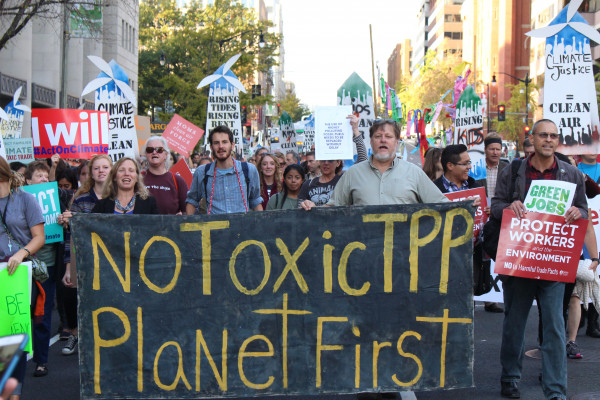
Trade for People and the Planet
We propose a vision for trade that serves working people and protects the planet. That is why we have to say #NoNAFTA2, and make a radical refusal of any new or re-worked corporate trade deals. We want to #ReplaceNAFTA with trade for people and the planet.
#NoNAFTA2
We must make sure there is #NoNAFTA2. We will not accept any more deals like the original NAFTA or TPP that are created by and for Wall Street. We will also never be complicit with a nationalist agenda that targets the poor, people of color, and basic environmental protections at home while ensuring oppression, poverty, and environmental destruction abroad. We must fight NAFTA and also #DefendDACA, make sure #Not1More person is deported, rise up because #BlackLivesMatter, and put our bodies on the line so that there is #NoWall.
We also do not support Trump’s threat to terminate the deal altogether. Any termination or re-negotiation has to happen in consideration of the real impacts for workers, preparing for important shifts in the economy that could lead to unemployment and displacement.
We will oppose the continuation and expansion of the ISDS trade tribunals that give major corporations the power to prevent laws in the public interest that protect workers, the environment, our health and our food systems, safety and access to information.
Anything short of that means more power for mega-corporations over workers, a world order constructed in complicity and collaboration with white supremacy, the selling off of our environment and our democratic sovereignty.
#ReplaceNAFTA
Our fight against NAFTA is a golden opportunity to push our vision for trade: trade for people and the planet. We want an entire replacement of NAFTA negotiated by the working class, environmentalists, consumer protection organizations, indigenous peoples, black people, immigrants, family farmers and rural communities, artists, social movements and organizations, Internet freedom and security organizations, and trade experts that care about justice and dignity for all.
We want trade that makes sure no corporation can take advantage of workers anywhere, that labor and environmental standards are high in North America and are tied to projects of economic sustainability and prosperity that are led by communities, not greedy multinational corporations. Fair trade requires free, prior, and informed consent of indigenous peoples to be mandatory with any matters concerning their territory, sovereignty, and culture.
Fair trade would empower popular assemblies with social organizations from across the continent – as happened with the Encounter of Social Organizations of Canada, United States, and Mexico, which produced a visionary proposal for collaborations between the three countries – to have democratic decision-making power.
To achieve fair trade, negotiation must not be in secret but must be transparent. It must not be limited to transnational corporate interests but be led by broad civil society organizations, family farmers and small businesses to participate. There must be democratic checks and balances as the negotiation proceeds, accompanied by public hearings and legislative oversight. Ending corporate trade will not occur by tinkering, but through the transformation of the process and goals of trade deals.
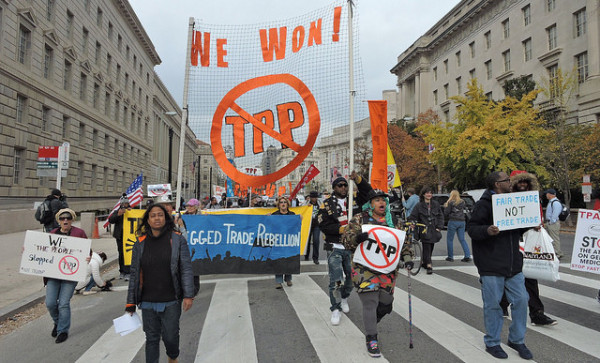
Our Strategy for Action
Our first task is education, this requires exposing NAFTA for the corporate trade deal it is through corporate and social media and then mobilizing people to take action in all three countries. Our second task is delaying the negotiation process as much as possible. The Mexican presidential elections of mid-2018 and the congressional elections of the US in fall of 2018 are critical factors that will change the political climate. There will be a surge in progressive politics in both countries, creating a much more favorable electoral panorama that will help make sure corporations cannot lock in this disastrous replay of NAFTA. We cannot let these secret negotiations go under the radar, we must expose them.
The NAFTA renegotiation must be at the forefront of the national political agenda as occurred with the TPP. Voters in the US and Mexico must make support of another corporate NAFTA a central issue in 2018 so that politicians who support trade for big business pay a political price. Renegotiation of NAFTA should not be conducted by an outgoing Mexican president who does the bidding of big business or by a US Congress in bed with transnational corporate interests and a racist President. Replacing NAFTA must be an issue for the 2019-2020 electoral agenda as well. This is an opportunity to revolutionize trade for the well-being of the people and the planet.
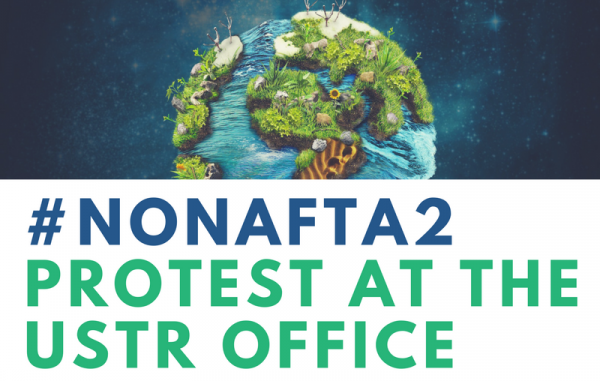
Here are the actions we are taking now to make that happen:
Twitter Storm
Every negotiation round (every three weeks for the rest of the year) we will organize a Twitter Storm to let negotiators know that we are watching and we are shaping the conversation. In addition, these twitter storms will be used to educate and activate people in the US, Mexico and Canada. This has already started. On the inaugural day of NAFTA’s renegotiation, Popular Resistance launched a #NoNAFTA2 Twitter Storm that produced over 1,900 tweets and generated over 800,000 impressions.
The next round will be in Canada this month. For more information follow us on Twitter @PopResistance,@FlushtheTPP (trade for people and planet’s twitter) and join Trade for People and Planet.
#NoNAFTA2 October Action
Protests are building in Mexico and must do so in the US and Canada. The movement for fair trade must protest at every NAFTA negotiation to show opposition and build the movement for fair trade. The fourth round of NAFTA negotiations will be held in Washington, D.C. in October and we will be outside their secret meetings making our voices heard. We want Trade for People and the Planet. For more information follow our Facebook page!
Pressure Congress to revoke Fast Track
The Obama administration managed to pass Fast Track (or Trade Promotion Authority), which limits Congress to an up or down vote on the TPP without any ability to amend the deal. Fast Track legislation is applicable to all trade deals until July 31, 2018 with the option of an extension through 2021. We must pressure members of Congress to revoke Trade Promotion Authority by making NAFTA 2 as politically toxic as the TPP.
Congress must Choose the People, Not Big Corporations
NAFTA2 is a conflict between corporations and the people, Congress has to pick a side and suffer the consequences when elections occur. Will they stand with their big corporate donors or with the people they were elected to serve? If they stand with big business interests, they will lose elections as voters will not support them.
The movement of movements that came together to stop the TPP was able to make TPP stand for “‘toxic political poison’. Trump’s NAFTA plans are no different and the diverse groups that will be negatively impacted must come together to stop toxic corporate trade once again. We can do so and when we win, we need to transform trade so it serves the people and protects the planet.
Join the campaign for trade that puts people and the planet first. For more information and to get active, join the Trade for People and Planet mailing list.
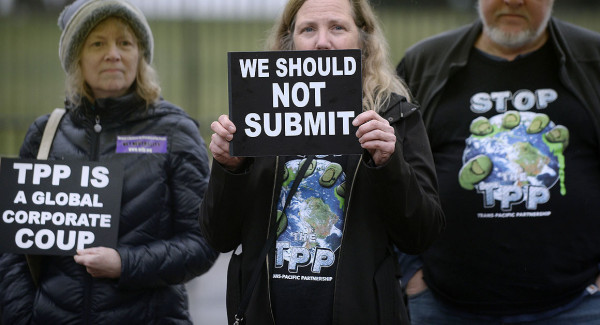
Daniel Cooper Bermudez is Campaign Coordinator of Trade for People and Planet.

